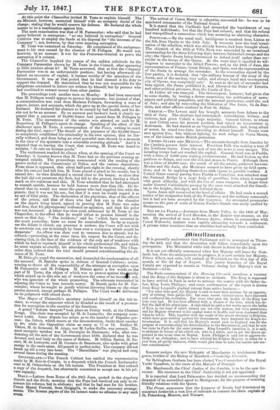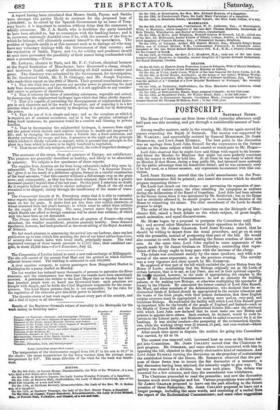jFfl Istellantous.
It is generally understood that Parliament will be prorogued on Thurs- day the 22d, and that the dissolution will follow immediately upon the prorogation. The Ministerial white-bait dinner is fixed for the 21st.
It is not yet officially announced when her Majesty will leave for Scot- land; but, from the arrangements in progress, it is now certain her Majesty, Prince Albert, and suite, will embark at Woolwich on the 31st day of this month, or the 2d day of August. The junior branches of the Royal Family are expected to remain at Osborne during her Majesty's visit to Scotland.—Globe.
The Paris correspondent of the 2Iforning Chn.nicle mentions a rumour that the King of the Belgians is about to abdicate. The King is supposed to have arrived in Paris in order to arrange the matter with his father-in- law, King Louis Philippe; and some confirmation of the report is drawn from King Leopold's gradual retreat from active business- " For scene time past, his Majesty is said to have been anxious for an opportu- nity of retiring from public life; but some recent circumstances have hastened and confirmed his resolution. For seine time past the health of the King has been very bad. lie has been afflicted with a disease of the liver, which has de- fied the skill of his physicians. A visit which he paid a few weeks ago to the baths of Ems, in the hope of relief, turned out not only useless, but even pernicious; and his Majesty returned to his capital worse in health, and more depressed than when he left it. This, together with the result of the recent elections in Belgium, which have gone entirely against the Government, have hastened the King's de- termination. It is said that his Majesty's recent visit to England was for the purpose of communicating his determination to the Government, and that he now has come to Paris for the same purpose. King Leopold'e intention is, it is said, to abdicate in favour of his eldest son, who is a minor, and to get the Qaeen ap- pointed in the mean time as Regent. Louis Philippe is said not to approve en- tirely of an abdication; and to have advised his Belgian Majesty to retire for a year from all public business, which would give time to take the matter into ma- ture consideration."
Rumour assigns the new Bishopric of Manchester to Archdeacon Mus- grave, brother of the Bishop of Hereford.—Cambridge Chronicle.
Sir Bellingham Graham has been elected Vice-Commodore of the Royal Yacht Squadron, in the room of the Marquis of Donegal.
Mr. Macdonnell, the Chief Justice of the Gambia, is to be the new Go- vernor. His successor in the Chief Justiceship is not yet appointed.
It is reported that Lord Palmerston has decided on recommending the despatch of an accredited agent to Madagascar, for the purpose of restoring friendly relations with the Queen.
The Praise announces that the Emperor of Russia had determined to construct forthwith a vast line of railroads to connect the three cartels of St. Petersburg, Moscow, and Warsaw. A report having been circulated that Messrs. Smith, Payne and Smiths were amongst the parties likely to contract for the proposed loan of 1,000,0001., to be raised by the Spanish Government by an issue of Trea- sury bonds, it is important to mention without delay that the statement is Wholly erroneous. Mr. J. A. Smith, who is doubtless the party intended to have been alluded to, has no connexion with the banking-house; and it is, moreover, extremely doubtful even if he, with the consent of the firm to which he belongs, will ultimately commit himself to the speculation. The position of Spanish credit is at this moment such as to damage all who may have any voluntary dealings with the Government of that country; and the reputation of Smith, Payne, and Co. for solidity and prudence should at once have prevented the possibility of their names being confounded with such a proceeding.—Times.
Mr. Ledoyen, chemist in Paris, and Mr. F. C. Calvert, chemical lecturer at the Royal Institution of Manchester, have discovered a cheap, simple, and inodorous liquid, capable of disinfecting all fetid animal matter and gases. The discovery was submitted by the Government, for investigation, to Dr. Southwood Smith, Mr. R. D. Grainger, and Mr. Joseph Toynbee; who made their report on the 29th of March. Their general conclusions are- " 1. That this fluid does not possess any peculiar power in preserving the dead body from decomposition; and that, therefore, it is not applicable to any consider- able extent to purposes of dissection.
"2. That it removes the Peter of putrefying substances, vegetable and animal, by decomposing the sulphuretted hydrogen upon which that Teeter chiefly depends. "3. That it is capable of preventing the disengagement of sulphuretted hydro- gen in sick chambers and in the wards of hospitals, and of removing it in a few minutes when it is present, not merely by dissipating the smell, but by destroying the poison. "4. That the use of it is simple and easy; and as the occasions on which it is required are of constant occurrence, and as it has the peculiar advantage of being itself inodorous, its possession would be a comfort and blessing to private families.
"5. That by decomposing the sulphuretted hydrogen, it removes from night soil the poison which renders such matters injurious to health and dangerous to life; and, by changing the ammonia from a volatile into a fixed substance, and thereby preventing its escape and loss, it preserves in the night soil the principle which renders it chiefly valuable as manure, while it presents that principle to the plant in a form which is known to be highly beneficial to vegetation. 6. That its use will only mitigate, not prevent, the evils of imperfect drainage."
The accounts of the crops from all quarters of Europe, are satisfactory. The potatoes are generally described as healthy, and likely to be abundant in quantity. We subjoin a few specimens of these reports.
The supplies from America are far from being exhausted; indeed they seem in- exhaustible. The New York correspondent of the Times, "A Genevese Travel- ler " gives it as the result of a deliberate opinion, formed on a careful examination of the local accounts, "that this country will,have a full average crop on the grain sown; and, consequently, as that has been much enlarged, there will be a greatly increased quantity beyond that of the last year. On this point I entertain no doubt. As it respects Indian corn it will be almost unlimited." Much of the old stock remained to be shipped; Mainly through the insufficiency of the means of trans- port. The Commercial Gazette of St. Petersburg states that it is able to contradict some reports lately circulated of the insufficiency of Russia to supply the demands made on her for grain. It shows that not less than nine million chetwerts of wheat remained from last year's harvest; to which must be added three millions for the supply of St. Petersburg. The same journal states that the quantity which Russia can afford to foreign countries will be about four millions; of which only two have been as yet demanded. The Presse cites favourable accounts from all quarters of France—the crops abundant, the weather magnificent, potatoes generally healthy. Some diseased specimens, however, had been produced at the recent sitting of the Royal Academy of Sciences.
We feel much pleasure in announcing the arrival into our harbour, since our last publication up to nine o'clock this morning, the date of our latest advice from Cove, of seventy-four vessels laden with bread stuffs, principally maize. The total registered tonnage of those vessels amounts to 17,517 tons; their combined car- goes, to about 23,356 tons.—Cork Examiner, July 12.
The Corporation of London intend to erect a new coal-exchange at Billingsgate. The site will consist of the present Coal Mart and the ground on which thirteen adjacent houses stand. The building is estimated to cost 100,0001. A rival omnibus company, to convey passengers from Hungerford Market to Paddington for a penny, started on Monday. The hot weather has induced many thousands of persons to patronize the River steamers; and the consequence has been that the vessels have been exceedingly crowded. A gentleman has written to the Lord Mayor that on Sunday last four- teen hundred people were on board one Gravesend boat: such practices are fraught with danger, and he holds the Chief Magistrate responsible for the conse- quences. The Lord Mayor protests that he is not responsible; for the rules for the regulation of the steamers give him little power to interfere.
The thunder-storm of last week raged in almost every part of the country, and did a deal of injury in all directions.
Results of the Registrar-General's return of mortality in the Metropolis for the
week ending on Saturday last—
Number of Summer deaths. average, Zymotic (or Epidemic, Endemic, and Contagious) Diseases 215 .. . 226 Dropsy, Cancer, and other diseases of uncertain or variable seat 102 .... 103
Diseases of the Brain, Spinal Marrow, Nerves, and Senses 156 ... 157 DiStlite• of the Lungs, and of the other Organs of Respiration 195 .... 226
Diseases of the Heart and Blood-vessels 21 .... 25 Diseases of the Stomach, Liver, and other Organs of Digestion 91 .... 94 the Kidneys, ac
Diseases of 8
Childbirth, diseases of the Uterus, &c. 11 .... 10
Rheumatism, diseases of the Bones. Joints, Sc. 7
Diseases of the Skin, Cellular Tissue, Sc. 2 Old Age 'Violence, Privation, Cold, and Intemperance Total (including unspecitted causes) 882 940
The temperature of the thermometer ranged from 106.4° in the sun to 36.5° in the shade; the mean temperature by day being warmer than the average mean temperature by 2.9°. The mean direction of the wind for the week was South- west.



























 Previous page
Previous page